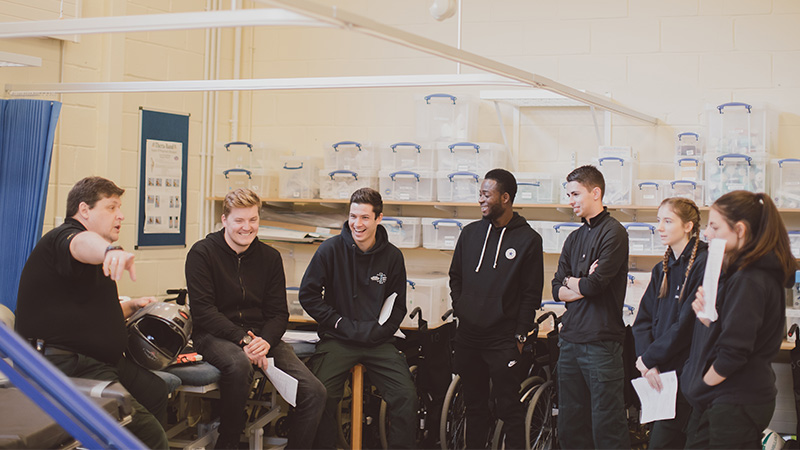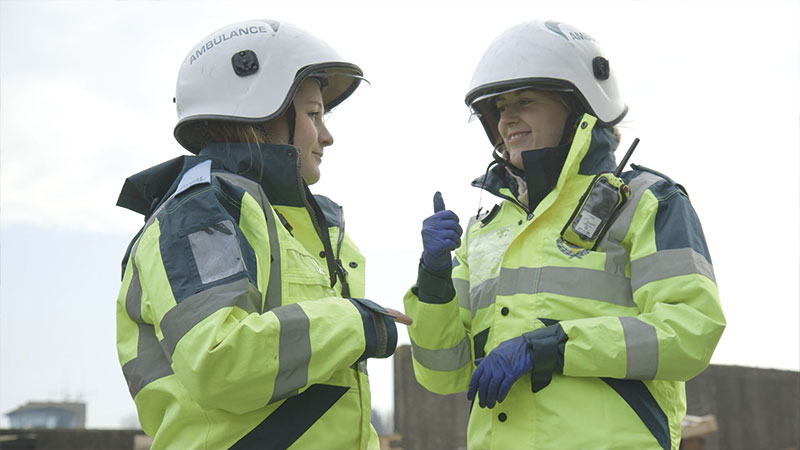UCAS code: B950
Start dates: September 2024 / September 2025
Full time: 3 years
Location: Headington, Headington (Marston Road site)
Department(s): Department of Psychology, Health and Professional Development
Overview
Responding to 999 calls. Delivering life-saving care. Helping people in their hour of need. Working on the front line is fast-paced and rewarding. If that’s your ambition, we’ll help you get there, training you to become a registered paramedic. We’ll also show you other exciting opportunities so you can forge a career as an allied health professional.
We’ve designed this course to help you care for patients with diverse healthcare needs, in and out of hospital settings. We’ve developed our modules in partnership with healthcare providers including South Central Ambulance Service NHS Foundation Trust.
As a student paramedic, you’ll complete placements in a variety of ambulance and healthcare settings in the Thames Valley region. Applying theory to practice is central to your time with us, so you become the best paramedic you can be.
Whether on placement or studying on campus, you’ll be surrounded by support. Our friendly teaching team will share their own experiences and expertise. And you’ll meet other students on the same journey as you by joining the Student Paramedic Society.

Why Oxford Brookes University?
-
Accredited course
Our degree is approved by the Health and Care Professions Council meaning employers will value your qualification.
-
Hands-on placements
You’ll experience at least 14 weeks of clinical practice education each year in diverse settings.
-
Benefit from specialist facilities
Apply your skills in our specialist clinical skills suites with a range of simulation equipment including a SimBulance.
-
Diverse career opportunities
Prepare for positions in clinical practice, education, management and research.
-
Experienced academics
Learn from a team who have worked as paramedics in a wide range of settings and listen to the stories from their careers as you kickstart your own.
-
Free language courses
Free language courses are available to full-time undergraduate and postgraduate students on many of our courses, and can be taken as a credit on some courses.
-
Accreditation(s)
Approved by the Health and Care Professions Council
Course details
Study modules
Teaching for this course takes place Face to Face and you can expect around 11 hours of contact time per week. In addition to this, you should also anticipate a workload of 1,200 hours per year. Teaching usually takes place Monday to Friday, between 9.00am and 6.00pm.Contact hours involve activities such as lectures, seminars, practicals, assessments, and academic advising sessions. These hours differ by year of study and typically increase significantly during placements or other types of work-based learning.
Please note: As our courses are reviewed regularly as part of our quality assurance framework, the modules you can choose from may vary from those shown here. The structure of the course may also mean some modules are not available to you.
Careers
Paramedics work in a variety of healthcare settings with pathways such as:
- clinical practice
- research
- education
- management.
Perhaps you’ll specialise in an area like critical care or forensic medicine. Maybe you’ll work with colleagues in general practice. There are even more niche opportunities like working on cruise ships or oil rigs, which appeal to graduates who want to have an international career.
Professional accreditation
Please note that the Health and Care Professional Council's approval is subject to review and can be withdrawn at any time.Our Staff
Mr Martin Berry
Read more about MartinShelly Everett
Read more about ShellyEntry requirements
Wherever possible we make our conditional offers using the UCAS Tariff. The combination of A-level grades listed here would be just one way of achieving the UCAS Tariff points for this course.
Standard offer
UCAS Tariff Points: 112
A Level: BBC
IB Points: 30
BTEC: DMM
Contextual offer
UCAS Tariff Points: 88
A Level: CCD
IB Points: 27
BTEC: MMM
Specific entry requirements
A Level: Including one A Level or a comparable Level 3 qualification in a science subject (e.g. Biology, Chemistry, Maths, Physical Education, Physics, Psychology).
GCSE: Grade 4 (C) in English, Maths and Science. For English and Maths, Level 2 Functional Skills are accepted as alternatives to GCSEs.
Relevant experience or a suitable indication of your interest in, and understanding of, the relevant healthcare profession.
Applicants must have a full clean UK driving licence, ideally with provisional C1 entitlement. This must be completed before the publication of A-Level results in the same year as entry.
We welcome applications from mature students, but they must show evidence of academic achievement in the last two-years, typically meeting the entry requirements. Please contact us for further advice on your circumstances, which may include recommendation to undertake further recommended academic modules/A Levels.
All students are screened for HIV and Hepatitis A, B and C. This is a Department of Health requirement for this professional group.
If clearance has not been completed prior to enrolment, then enrolment may not be possible. If enrolment has been agreed, then continuation on the programme will be contingent on satisfactory clearances.
Please also see the University's general entry requirements.
Screening
All applicants will be screened for fitness to practise and a Disclosure and Barring Service (DBS) check will be made.
Selection process
All Oxford Brookes University Health and Social Care Programmes conduct Value Based Recruitment (VBR). We recognise that values and attitudes have the greatest impact on the quality of people's care and their experiences.
VBR is a way of helping our Programme recruitment teams to assess the values, motives and attitudes of those who wish to work with people in health and social care settings. When we refer to values we mean, for example, the values included in the NHS constitution.
VBR focuses on 'how' and 'why' an applicant makes choices in how they act and seeks to explore reasons for their behaviour. Further details about the VBR framework can be found here.
Applicants will be assessed on their academic ability, their work experience and their ability to demonstrate the following qualities:
- caring and helping skills
- communication and interpersonal skills
- working with and respect for others
- a compassionate nature
- commitment to quality of care and improving lives
- reliability, honesty and trustworthiness.
Applicants will be shortlisted for interview based on the strength of their UCAS application.
Any place offered is subject to satisfactory Enhanced DBS clearance and health screening.
English language requirements
If English is your second language, you must be able to demonstrate that your level of English is of a sufficient standard (IELTS 6.5 or equivalent).
Please also see the University's standard English language requirements.
English requirements for visas
If you need a student visa to enter the UK you will need to meet the UK Visas and Immigration minimum language requirements as well as the University's requirements. Find out more about English language requirements.
Credit transfer
Many of our courses consider applications for entry part-way through the course for students who have credit from previous learning or relevant professional experience.
Find out more about transferring to Brookes. If you'd like to talk through your options, please contact our Admissions team.
Terms and Conditions of Enrolment
When you accept our offer, you agree to the Terms and Conditions of Enrolment. You should therefore read those conditions before accepting the offer.
International qualifications and equivalences
How to apply
Application process
Full time international applicants can also apply through UCAS
Tuition fees
Questions about fees?
Contact Student Finance on:
Tuition fees
Please note, tuition fees for Home students may increase in subsequent years both for new and continuing students in line with an inflationary amount determined by government. Oxford Brookes University intends to maintain its fees for new and returning Home students at the maximum permitted level.
Tuition fees for International students may increase in subsequent years both for new and continuing students.
The following factors will be taken into account by the University when it is setting the annual fees: inflationary measures such as the retail price indices, projected increases in University costs, changes in the level of funding received from Government sources, admissions statistics and access considerations including the availability of student support.
How and when to pay
Tuition fee instalments for the semester are due by the Monday of week 1 of each semester. Students are not liable for full fees for that semester if they leave before week 4. If the leaving date is after week 4, full fees for the semester are payable.
- For information on payment methods please see our Make a Payment page.
- For information about refunds please visit our Refund policy page
Financial support and scholarships
All eligible Paramedic Science students on courses from September 2020 (new and continuing) will receive a payment of at least £5,000 a year which they will not need to pay back. For more information please visit NHS Learning Support Fund (LSF).
Additional costs
Please be aware that some courses will involve some additional costs that are not covered by your fees. Specific additional costs for this course are detailed below.
You will be required to undertake clinical placements spent in a variety of settings across the Thames Valley region. You will need a car to travel to these settings and transport allowances will not be provided.
You will need to purchase a stethoscope suitable for practice and clinical assessment and examination of patients. You will also need a copy of the National Clinical Guidelines and associated pocket book. Further information on additional costs for healthcare courses can be found here.
Information from Discover Uni
Full-time study
Programme changes:
On rare occasions we may need to make changes to our course programmes after they have been
published on the website. For more information, please visit our
changes to programmes page.


.jpg?width=800&height=450&ext=.jpg)